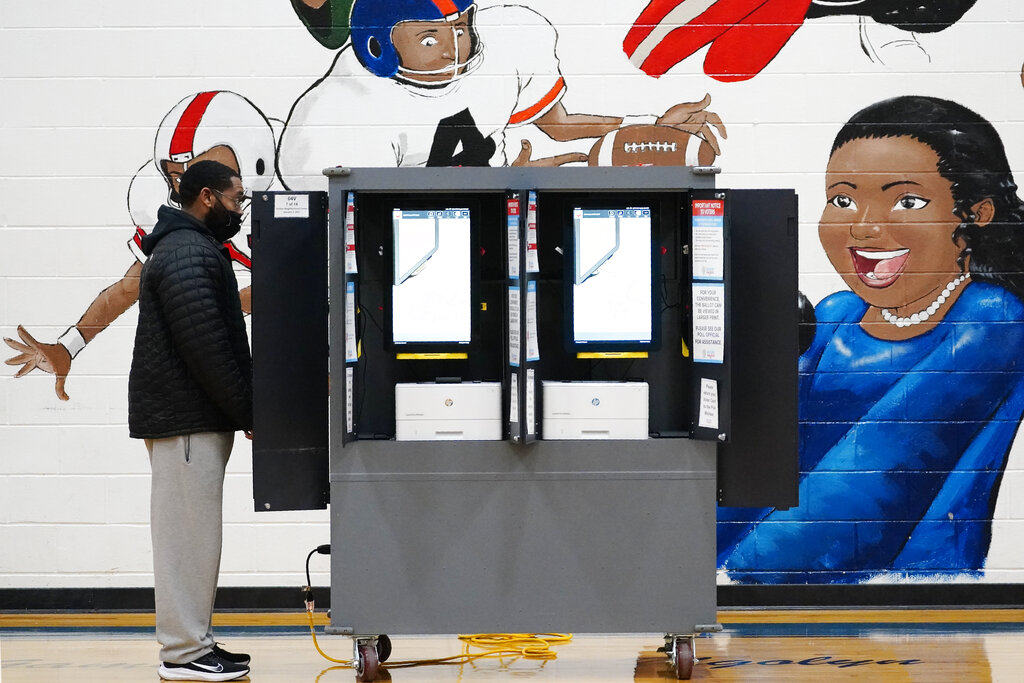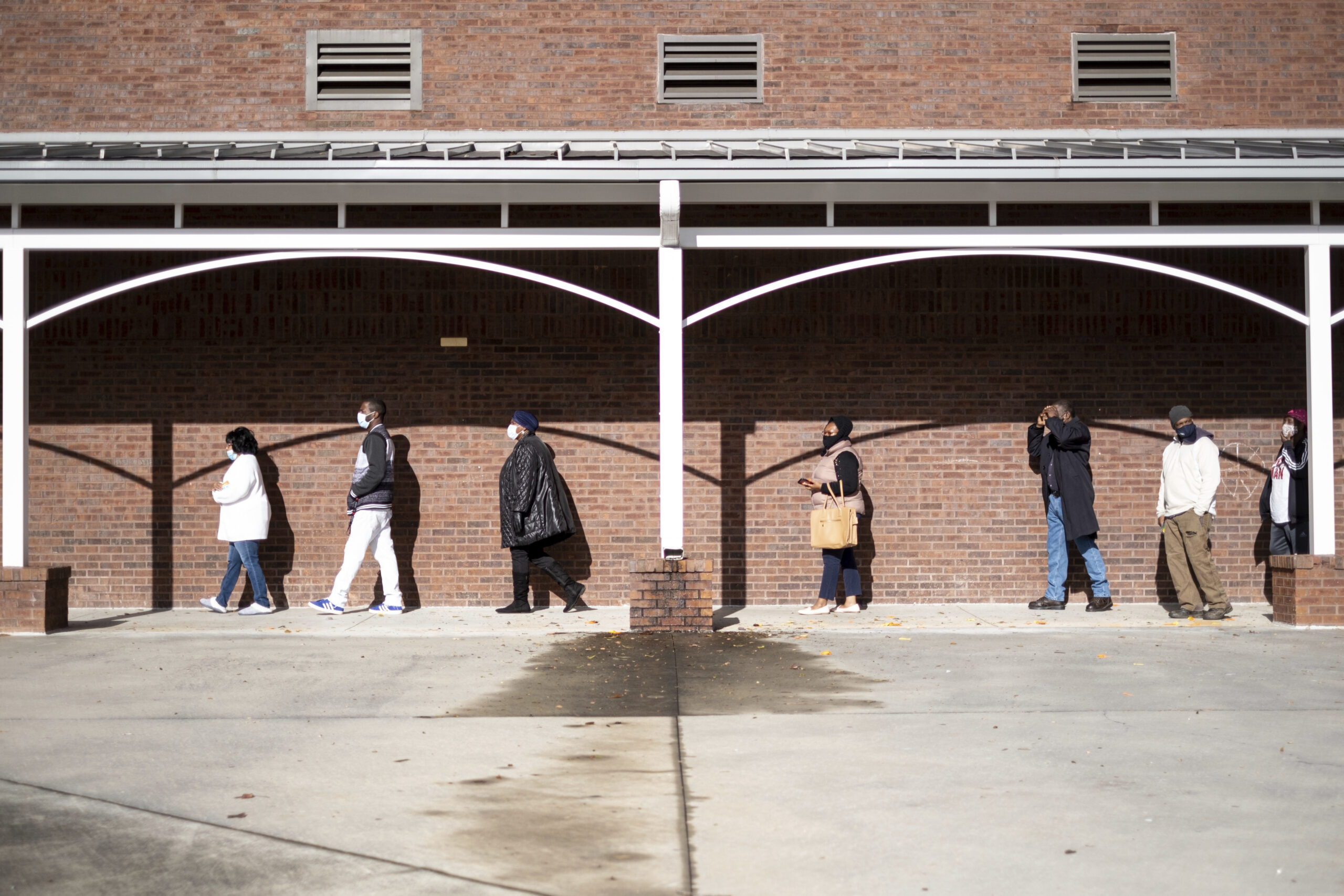Updated at 12:55 a.m. Wednesday
Three new faces are headed to Washington to represent Georgia in the U.S. House along with nine incumbents who easily won reelection.
Marjorie Taylor Greene won election unopposed in an open seat after expressing racist views and support for QAnon conspiracy theories. Democrat and state Sen. Nikema Williams will be the long-term successor to the late U.S. Rep. John Lewis.
Voters also approved three statewide ballot questions.
After weeks of early balloting, it was not immediately clear Tuesday night whether the state will award its electoral votes to Democrat Joe Biden or again supports President Donald Trump.
Also closely contested are two U.S. Senate races and House races in the 6th and 7th Congressional Districts in the Atlanta suburbs.
In one Senate race, incumbent Republican David Perdue, a close ally of President Donald Trump, faces Democrat Jon Ossoff in a race characterized by sharp attacks.
The second race is a special election for the remaining two years of a term originally won by now-retired Sen. Johnny Isakson. Republican Sen. Kelly Loeffler and Democrat Raphael Warnock advanced to a Jan. 5 runoff in Georgia.
5th District
Georgia state Sen. Nikema Williams, the chair of the Georgia Democratic Party, beat Republican Angela Stanton-King in the Atlanta-based 5th District. The 42-year-old Williams is set to join two other Black women, Atlanta Mayor Keisha Lance Bottoms and 2018 gubernatorial nominee Stacey Abrams, as among the state’s most recognizable, influential Democrats.
Williams said she wants to use federal power to provide more subsidized health care and guarantee voting rights. Stanton-King, 43, is a reality TV personality and outspoken supporter of Trump.
A special election runoff to become Lewis’ short-term replacement takes place next month, but the winner of that race will only be in Congress until Williams is sworn in on Jan. 3. Neither Williams nor Stanton-King is running in the special election.
6th District
Democrat Lucy McBath is vying for a second term in Georgia’s 6th District and is running against Republican Karen Handel, whom McBath unseated in 2018. The race in Atlanta’s northern suburbs centers on arguments about health care, abortion, support for police and gun control. McBath crafts an image as a bipartisan worker, but Handel says she’s too liberal. McBath is hitting Handel over health care and Handel’s opposition to abortion rights. Handel says McBath’s advocacy for gun control makes her a “single-issue” candidate and says she’s out of touch with voters.
7th District
Republican Rich McCormick seeks to hold on to suburban Atlanta’s 7th District for his party as Democrat Carolyn Bourdeaux attempts to win a district she lost by fewer than 500 votes to retiring GOP Rep. Rob Woodall in 2018. McCormick, an emergency room physician, touts empowering business owners and individuals. Bourdeaux, a public policy professor, says government needs to do more to provide access to health care and solve people’s problems. The fast-diversifying district includes parts of Gwinnett and Forsyth counties and is one of the most closely watched races nationwide.
9th District
Republican Andrew Clyde beat Democrat Devin Pandy in an open seat in northeast Georgia after incumbent Doug Collins chose to run for U.S. Senate. Clyde touted his support of gun rights and his success in getting a law changed after the IRS seized $940,000 from him in 2013. Pandy pledged a bipartisan, little-guy approach, saying his priorities include better access to health care, a higher minimum wage and an end to tariffs. Clyde far outspent Pandy, with the gun dealer loaning his campaign more than $1.4 million.
14th District
Republican Marjorie Taylor Greene won election in an unopposed race in northwest Georgia’s 14th Congressional District after Democratic challenger Kevin Van Ausdal dropped out and left the state. Greene has expressed racist views and support for QAnon conspiracy theories. She was supported by President Donald Trump, who called her a “future Republican star.” Greene has alleged an “Islamic invasion” of government offices and accused Jewish billionaire George Soros of collaborating with Nazis.
Other Congressional Races
Republican Buddy Carter won a fourth term in Congress, beating Democrat Joyce Marie Griggs in the coastal 1st District. Carter said he would focus on economic recovery. Griggs said it was key to keep the Affordable Care Act in place, and sought more stimulus money for people because of COVID-19.
Democratic incumbent Sanford Bishop won a 15th term in southwest Georgia’s 2nd Congressional District against Republican Don Cole. Bishop campaigned as a moderate focused on development, also calling for a stronger response to COVID-19. Cole said he would focus on economic development.
Incumbent Republican Drew Ferguson beat Democrat Val Almonord, winning his third term in western Georgia’s 3rd District. Ferguson touted work to increase internet access and improve business competitiveness. Almonord argued for expanding health care and more COVID-19 relief.
Incumbent Democrat Hank Johnson wins reelection in his race against Republican Johsie Cruz Ezammudeen. He will serve a seventh term representing the 4th District in Atlanta’s eastern suburbs. Johnson touts criminal justice reform and improving internet access. Cruz supported Trump and opposed abortion.
Republican Austin Scott won a sixth term against Democrat Lindsey Holliday and Green Party member Jimmy Cooper in the 8th District. Scott supported agriculture, rural hospitals and military bases. Holliday argued Trump endangers democracy and sought a stronger COVID-19 response.
Incumbent Republican Jody Hice won a fourth term in eastern Georgia’s 9th Congressional District. He defeated Democrat Tabitha Johnson-Green for the second straight time. Hice defended Trump, supported police and opposed abortion on the campaign trail. Johnson-Green emphasized access to health care.
Republican Barry Loudermilk beat Democrat Dana Barrett in the 11th Congressional District in the northwest Atlanta suburbs. Loudermilk won a fourth term focusing on economic recovery, low taxes and less regulation. Barrett emphasized health care and equal economic opportunity.
Republican Rick Allen won a fourth term against Democrat Liz Johnson in eastern Georgia’s 12th Congressional District. Allen opposed expanded federal health coverage and social service programs. Johnson ran unsuccessfully for state insurance commissioner in 2014.
Incumbent Democrat David Scott defeated Republican Becky Hites, winning a 10th term representing Georgia’s 13th Congressional District in Atlanta’s southern suburbs. Scott advocated for more money for COVID-19 relief and gun control. Hites said she would work to improve the district’s economy.
General Assembly
Democrats seek further gains in the Georgia General Assembly. They’re focusing on the House of Representatives, where Republicans hold a 105-75 majority but Democrats gained 11 seats in 2018. A majority would give Democrats a voice in drawing Georgia’s voting districts for the next 10 years and enhanced bargaining power on priorities including Medicaid expansion.
Public Service Commission
Incumbent Republican Jason Shaw is being challenged by Democrat Robert Bryant and Libertarian Elizabeth Melton for a spot on the Public Service Commission. Republican Lauren “Bubba” McDonald’s reelection is challenged by Democrat Daniel Blackman and Libertarian Nathan Wilson. Winners must reckon with the impact of Georgia Power Co.’s $25 billion nuclear plant on power bills. The incumbents say they’re balancing consumer and utility needs, but the challengers say the balance is too tilted toward utilities.
Ballot Questions
Voters statewide broadly approved three ballot questions. State constitutional Amendment 1 lets lawmakers earmark funds for certain programs. Amendment 2 lets people sue governments for illegal acts, but judges couldn’t enter an injunction ordering a government to do something or order a government to pay money. Referendum A exempts from taxes property owned by charitable groups such as Habitat for Humanity that sell homes to individuals through no-interest loans.








